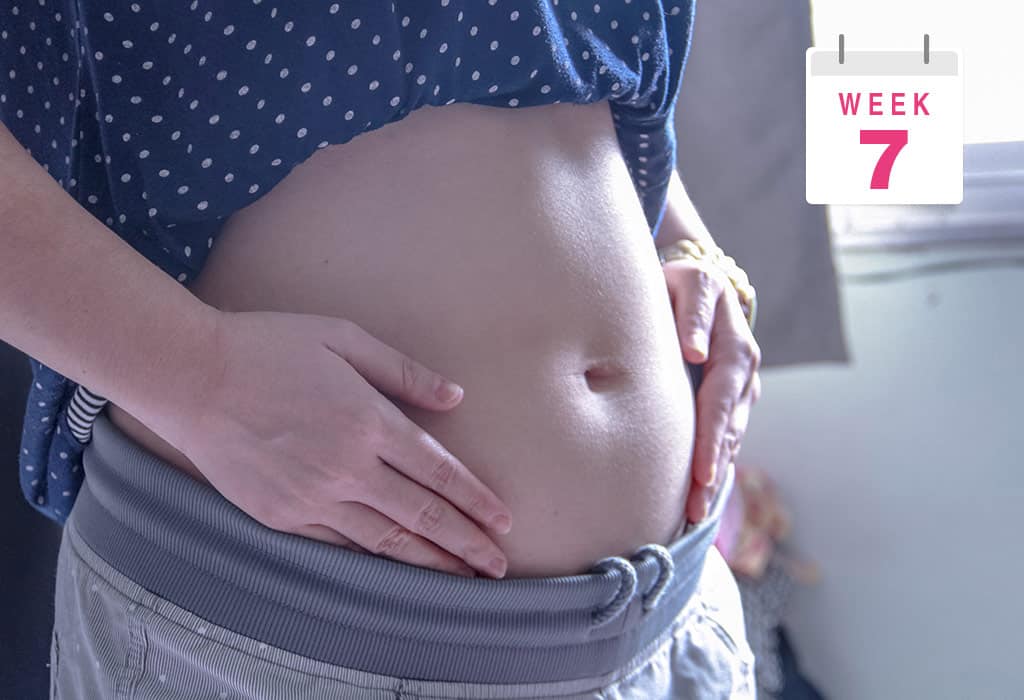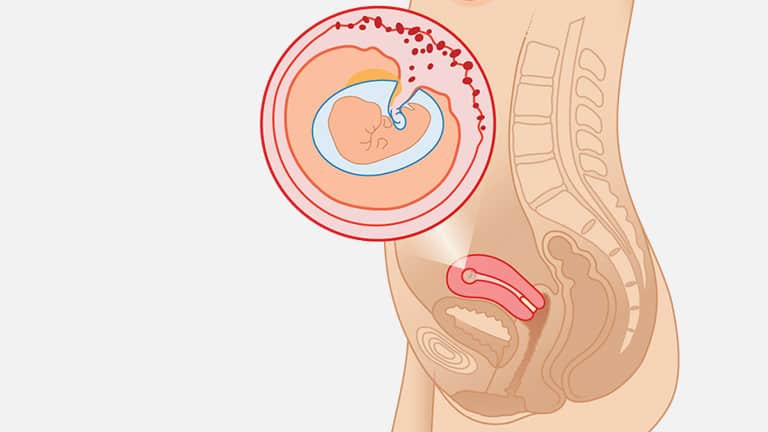
Table of Contents
Pregnancy is one of life’s most beautiful periods. Every little thing brings joy and excitement from selecting the baby’s name to choosing the clothing.
The first trimester is 7 weeks pregnant. You can find all sorts of questions and excitement during this process as all can be a little overwhelming. This is why this insightful article about everything was launched by Parenthood Bliss which can help you when you are 7 weeks pregnant.
How big is your 7 week fetus ?
Your kid has a length of 0.31 inches and this week weighs 0.04 ounces. This is the size of candy.
Your Baby’s Development at 7 Weeks pregnant

You may not experience a kicking or a jab, and you certainly haven’t even seen the doctor yet. You may have not had a lot of babies. But probably you’re anxious to know what’s happening there with your baby. In reality, it’s pretty much.
The heart, brain, liver, stomach, and kidneys – the key organs of a baby continue to form within 5 weeks and by 8 weeks, at your prenatal visit, you should be able to understand their heartbeat.
- Major growth: Your baby is developing fast, over the last week it has doubled in size!
- Arm and leg joints: The small embryo has sprung up arms and legs and starts to form joints.
- More complex brain: This week, the brain is also experiencing a boom in growth. It already has two hemisphere levels and becomes more complex every minute (100,000 new cells are rising accurately every minute).
- The growing digestive system: The digestive tract gets wider and extends somewhat into the umbilical cord. Later you will find your way into your rightful place.
- Kidneys: This week, your baby’s mouth and tongue are taking shape, and the kidneys are now in position, ready to commence their crucial role in waste management. Before you know it, your baby will begin producing urine, but fortunately, there’s no need for diapers just yet.
Your Body: 7 Weeks Pregnant Symptoms
Don’t feel so hot right now? You don’t know that you’re alone! The signs of pregnancy are now typically high. Here are some of the interactions you might have.
1. Morning sickness: In early pregnancy, more than 80 % of women undergo some form of nausea, and over half have dehydration. Sickness normally stops in the second quarter of the morning. Not just sickness in the morning sickness. At any time of day, it can and does hit, typically during the first trimester. Try to control the symptoms handled by eating a little more regular meals. Try to drink plenty of water during the day in tiny sips.
2. Exhaustion: In these early weeks, exhaustion will strike hard and you can’t do anything about it. Try to eat healthily and regularly (every few hours), drink plenty of water, and exercise (if you are up to it). Try to preserve your energy. And encourage yourself on the weekends to sleep and/or have a small rest when you can.
3. Bloating: The progesterone pregnancy hormone decreases certain roles in the body, particularly digestion. Extra digestion time causes excess gas to collect, making bloating more likely. Limiting carbonated beverages, avoiding unhealthy or fried foods, consuming smaller meals (but consuming more often), drinking plenty of water, slowly eating and well-known chewing will help to prevent excess petrol. This ensures that you are more likely to spend petrol if you do not want to).
4. Diarrhea: It can also start runs if your hormones shift and metabolism is delayed. Or maybe you’re vulnerable to dietary changes — or it’s perhaps a stomach bug. The most important thing is to remain hydrated with diarrhea. Drink plenty of juice and water, and eat soups of bronze. In two days, contact your doctor if the diarrhea does not clear up alone.
5. Excess saliva: Note now that your mouth is watering more? Excess saliva is a true sign of pregnancy not seen or heard by anyone. Doctors claim it protects the mouth and throat from irritating acids in the stomach that can impact the first trimester. Drinking plenty of water, mouth washing, sometimes blowing teeth and chewing gum will help to tame the drool.
6. Frequent urination: Your uterus stretches and your bladder already, which means that you have a higher urge to pee. In the second trial, the uterus gets a little higher and hopefully gives it a (temporary) break before late pregnancy, if the lady’s room is again very well known.
7.Swollen Breasts: At 7 weeks pregnant, your breasts may have grown significantly, possibly by a full cup size due to hormonal fluctuations, primarily estrogen and progesterone. While the size increase might be welcome news, the discomfort of tender, tingly, and achy breasts is a common side effect. This is attributed to increased fat deposition and heightened blood flow in the breast area.
Nipples may protrude more, but their heightened sensitivity can make them tender to the touch. The areola, the darkened skin around the nipple, has already enlarged and darkened, with further changes anticipated over the coming months. Additionally, the appearance of Montgomery’s tubercles, small sebaceous glands on the areola, is a normal part of breast changes during pregnancy, all of which are essential preparations for breastfeeding your newborn in approximately 33 weeks.
8. No symptoms: If no symptoms trouble you at the end of 7 weeks pregnant, you can wonder what is going on. Without signs, nothing is wrong or it isn’t usual for you to get pregnant. You may either get them a bit later, or you could be one of the few who doesn’t have a difficult first fifth.
Your Life at 7 Weeks Pregnant
Even if it doesn’t look slightly different, your body undergoes all kinds of big changes that may influence your daily life. There are a couple of ways to be cautious with yourself.
1. Best tip: In the formation (think placenta and amniotic sac), water plays a great role in your baby’s life. It can also help relieve early signs of pregnancy, such as tiredness, headaches, and nausea. You can remember to stay hydrated when you take a water bottle with you everywhere you go. Choose a fun style, like the Easy Modern or Clean Wave, or go wide with Hydro Flask 40 oz. Bottles with aim marks like this can be a perfect way to keep you on plan all day long for extra encouragement.
2. Time for some self-love: You are a human being, and that isn’t an easy accomplishment. Put a new style in the sitting area or a glamorous (but gentle) facial to you, while you can still see your feet.
3. Great for your body: Fatigue and nausea can make workouts look out of the topic. A little activity will improve your energy levels as your muscles stretch. Check out a prenatal yoga course in your location if you’re up for it. If it’s too much now, fall into a pose for the child or walk around the block in 10 minutes.
4. Bring the rest to Dr. Google: Spots? Clasps? Don’t have any symptoms? In most cases, you don’t care, and frightening searches by Google will just scramble you. You can express your questions to the gynecologist at your next assessment with your phone or notepad. Go ahead and visit your doctor if the problems do not go away. It will often relieve your anxiety on the phone or tell you when the best approach might be a visit to the hospital.
What to Expect at Your First Prenatal Visit
When you wait patiently (typically about 8 weeks), study up on what to feel on your very first visit to the prenatal physician.
The overview here is:
1. Medical history chat: Your OB will be asking about your overall health background and your gynecological background. Remember what the first day was because they’re going to ask to help you decide how far you’ve come (i.e. the due date). Know which drugs or medicines you are taking right now so that they are sure that they can log off (or not). They will probably be curious about illnesses in your family and the families of your partner, so inquire about family members in anticipation if you are uncertain.
2. Physical exam: Including blood pressure and height and weight monitors and pelvic examinations, you can have a whole inspection. A pap-smear is included in your workup. Many docs make an ultrasound during this session, in which case a relatively tiny tapping heartbeat can be seen.
3. Urine test: Prepare to pee in a glass because it will measure your urine to validate your pregnancy. Urine will also be screened for protein, glucose, white blood cells, and more, likely at every time doctor’s appointment is scheduled.
4. Blood work: Your blood sample is taken to know your blood type and the Rh (super essential to stop problems) and anemia. Vitamin D insufficiency, few immunities, and more may be examined.
5. Q&A: Your doctor will possibly provide you and your baby with guidance to keep you and your pregnancy fit and active. Here’s your opportunity to voice all of your fears and ask all of those questions!
Your 7 Weeks Pregnant Belly
You might begin to feel like you’ll have a bit of a tummy between bloating and the additional pound or two you might have put on (totally normal). However, you may not look pregnant until about week 12.
Week 7 pregnancy Precautions and Tips
Although you will have to go to the bathroom every hour, keep drinking plenty of water
Make sure you cook every meat you consume. Get weekly expert advice on pregnancy to monitor the health of your baby and to ensure your child’s well-being over the nine months!
Finishing Lines-
We believe in sharing some extra love at Parenthood Bliss! So for your 7 weeks of pregnancy here are some brownie tips.
FAQs: 7 Weeks Pregnant
1. What is and how do I prevent toxoplasmosis?
2. How likely is one to be pregnant with twins?
3. Can someone have cramps at 7 weeks pregnant?
Reviewed By :

Esha Chainani - Obstetrician and Gynaecologist
Dr. Esha Chainani is an Obstetrician, Gynaecologist, and laparoscopic surgeon who aims to break the stigma around women’s health by advocating an inclusive and open practice of obstetrics and gynecology and an author of several internationally published research papers and health articles in the media like the Swaddle.
She also founded Premaa, a non-profit to reduce maternal morbidity and eventual maternal mortality by providing lower-income pregnant women living in urban areas with cell phone access through an app that can feature an entire section about contraception as well for a whole gamut of reproductive health.
A panel for multiple health sessions including with the UN, USAID, BMC, gender at work, and multiple non-profit organisations, and is on the advisory panel of the South Indian medical students association.





